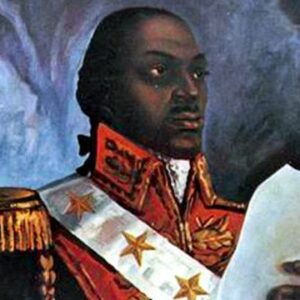During the French Revolution, Toussaint Louverture, a former slave, led the Haitian freedom struggle and briefly established Haiti as a black-governed French protectorate. The Haitian Revolution is modern history’s sole successful slave revolt—at a period when most slave revolts ended in executions and failure, he led a revolution that resulted in the foundation of an independent state. He was born into slavery at a time when cruel treatment of black people was permitted, but he was fortunate to have white masters who treated him well and allowed him to get an education. He was a bright and hardworking young guy who was also knowledgeable about medicinal plants and a skilled horseman. The writings of French thinkers who advocated for individual rights and equality affected him greatly. The colored people of Saint-Dominique (now Haiti) resolved to fight for their right to freedom and dignity, inspired by the French Revolution, which advocated for significant social and political reforms in France. Soon after, a major slave revolt erupted, with Toussaint emerging as its leader. He was a deft, brave, and idealistic general who transformed a slave society into an independent state, of which he became the governor.
Childhood and Adolescence
He was born in Saint-Dominique on May 20, 1743. The specific facts of his childhood are unknown, but it is widely assumed that his father was Gaou Guinea, a younger son of the King of Allada, and his mother was Pauline, his second wife. Toussaint was the oldest of the family’s several offspring.
His father had once been a free man who had been caught and sold into slavery, despite the fact that he was born as a slave. Toussaint was fortunate to have a lenient instructor who allowed him to read and write. He became a voracious reader, devouring whatever he could get his hands on. He appreciated the teachings of the french enlightenment philosophers in particular.
He could speak three languages by the age of 20: French, Creole, and Latin. He’d also picked up some information on therapeutic plants and herbs.
A Years Later
He ultimately gained his independence from his owner, albeit he continued to work for him voluntarily. He married, raised a family, and settled into a comfortable existence over time.
In August 1791, a slave uprising erupted in the northern province, with slaves setting fire to plantation houses and crops, as well as killing whites. As a free man, he assisted his old master and his wife in escaping. Before joining the revolution, he made sure that his wife and children were safe.
He learned that some of the rebel commanders were willing to make concessions to the European radicals, which he did not agree with. As a result, he formed his own army and taught his followers guerilla warfare tactics.
Recognizing that its reign was in jeopardy, the French National Convention extended citizenship and freedom to all blacks living inside the empire in order to bolster the black population’s loyalty. After that, in 1794, Toussaint joined the French in their battle against Spain.
He commanded the French in driving the British off of the island and subsequently seize the Spanish-controlled section. By 1801 he had established Saint-Dominique as an autonomous state, despite the fact that it was still under French administration. He even prepared a constitution in which he declared slavery abolished and named himself governor.
He gained near-absolute power, and there was no provision in his jurisdiction for a French official. All blacks were emancipated under his reign, and he placed a premium on maintaining law and order as well as encouraging trade and business.
To persuade Napoleon Bonaparte of his patriotism, he pretended to be a Frenchman. Despite the fact that Bonaparte confirmed Toussaint’s status, he considered him an impediment to Saint-reinstatement Dominique as a prosperous colony.
Toussaint suspected Bonaparte of attempting to reintroduce slavery in the province, so he assembled a massive army in preparation for war if the French attempted to seize control. He was very concerned about protecting the free society that he had worked so hard to create.
Napoleon ordered his brother-in-law, Charles Leclerc, with a massive army to capture Toussaint, just as Toussaint had dreaded. After a few weeks of murder and brutal warfare, the black army began to splinter, and several of the most powerful black leaders allied with Leclerc.
Toussaint eventually consented to lay down his guns in exchange for Leclerc’s pledge that slavery would not be restored. However, the French arrested and imprisoned him shortly after in treachery.
Personal History and Legacy
In 1782, he married Suzanne Simone Baptiste. In his youth, he fathered multiple children with several women, many of whom predeceased him. Though there isn’t much information about all of his offspring, Placide, Isaac, and Saint-Jean are recognized to be his genuine children.
He was apprehended by the French in July 1802 and imprisoned in Fort-de-Joux, Doubs. On April 7, 1803, he died. Malnutrition, pneumonia, and tuberculosis are thought to have contributed to his death.
Estimated Net Worth
Toussaint is one of the wealthiest War Heroes and one of the most popular. Toussaint Louverture’s net worth is estimated to be $1.5 million.


